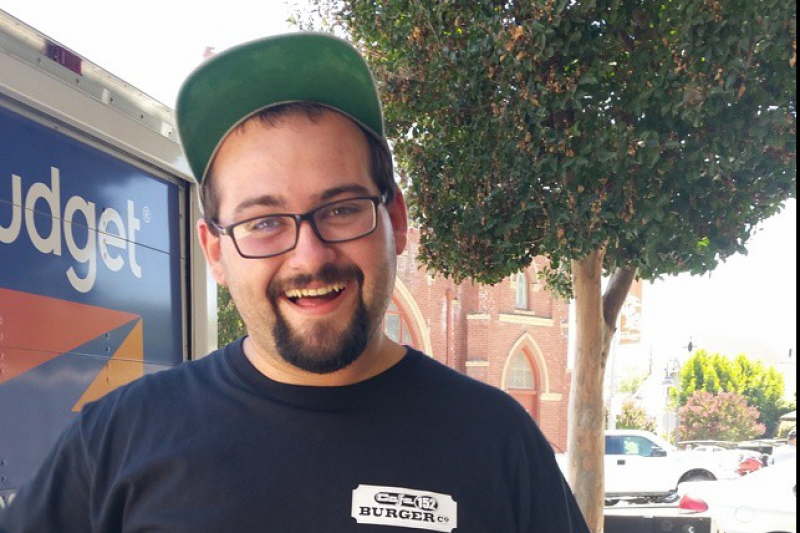Gavilan’s Shanna Webb volunteers with Red Cross after
hurricane
Gilroy – Shanna Webb served seven years in the United States Air Force. She has slept in the dirt and is used to eating field rations. But nothing could prepare her for the devastation she encountered while volunteering with the American Red Cross during relief operations after Hurricane Rita.
“You always had to be careful where you were stepping,” she said. “If you took the whole city of Gilroy and turned off all the lights, think of how scary it would be. Then throw in glass and power lines and dead animals … The whole place just looked like a war zone only there was no enemy around.”
Hurricane Katrina, which hit the Gulf Coast Aug. 29, may be the most memorable hurricane of the 2005 season, it wasn’t the most powerful. Hurricane Rita hit ground Sept. 24, and while many Gulf Coast residents heeded evacuation warnings, the storm was about 420 miles wide and affected many rural Texas communities, leaving thousands without power.
Webb signed up to volunteer with the Red Cross following Hurricane Katrina.
“I just couldn’t watch it on my television. I couldn’t just sit there and see it. I had to do something,” the 34-year-old Gavilan College student said.
The Red Cross called her the same day to complete a one-day training session. However, she wasn’t activated until Rita struck.
In the Air Force, Webb worked doing field feedings serving food to soldiers, and was assigned to perform mass feedings in Port Arthur, Orange and Deweyville, Texas – areas nearly flattened from the storm. She served for about two weeks in Texas from Sept. 26 to Oct. 7.
At its peak, her crew served more than 6,600 meals daily. They are currently serving about half as many.
“The need was unbelievable,” Webb said. “You were always going to run out of food and the numbers (of hungry people) were always growing. And you’ve got to make a choice as to who you’re going to give the last meal to.”
The Red Cross crews ran out of baby formula and food daily, and by the time they could get to remote areas – six days had passed, she said.
Webb’s unit was stationed in a church. With temperatures reaching the high 90s and oppressive humidity, they slept in the kitchen with the windows open – only to be bitten by mosquitoes throughout the night.
During the day, she was attacked by fire ants and the sun. Webb received second degree sunburns on her face, shoulders and neck.
According to Webb, power lines lay criss-crossed on the ground, the smell of rotting fish permeated the air and overflowing trash bins reeked of foods spoiling in the heat.
Driving down the streets of rural Texas, Webb photographed a McDonald’s restaurant – totaled in the storm, the golden arches lying in a twisted heap on the ground.
She recalls one of the happier moments of the trip – the day a garbage man came to empty a trash bin of rotting food from their site.
“We were clapping and celebrating because the garbage man came … it’s the little things that mattered,” she said laughing.
Webb witnessed how one’s perspective changes in the wake of a crisis.
“In the world of a disaster, a can of beans has a lot more value than a Gucci purse. It means you’re going to live an extra day,” she said.
In the days after Hurricane Katrina, network television stations showed images of looters stealing sneakers, athletic gear, and stereo equipment.
But Webb never saw anything like that during her efforts after Hurricane Rita.
She watched as romance blossomed between a Texas Ranger and a shop owner. She watched as people who had nothing, helped each other. And instead of faces of defeat, she saw strength as they assessed the damages and started to rebuild what they had lost.
“Even though they had a lot less, people gave a lot more,” she said. “It was people helping people … I never heard so many people in my entire life saying, ‘God bless you. I love you. Thank you very much.’ Very few times does the media glamorize the best of humanity – and 99 percent of the time that’s what happens.”
Webb hopes to return in a year to the towns in Texas she visited. She believes they will be nearly rebuilt.
“Those people had big hearts and big souls and a big will to survive and pick up the pieces,” she said. “Maybe that’s how we all are in the scope of things.”
In the months since Katrina and Rita, Webb believes people are starting to feel a form of donation apathy, with so many natural disasters occurring around the world. She fears Hurricane Wilma will destroy parts of the south still recovering from the hurricanes last year.
Wilma hit Florida Monday with winds reaching up to 125 mph, knocking out power to six million people. At least six deaths were blamed on the hurricane, Associated Press reports indicated.
“We’ve just never seen anything like this with all these hurricanes,” Webb said. “We’ve just got to give until it hurts right now – and if we do – it will start to feel good.”












